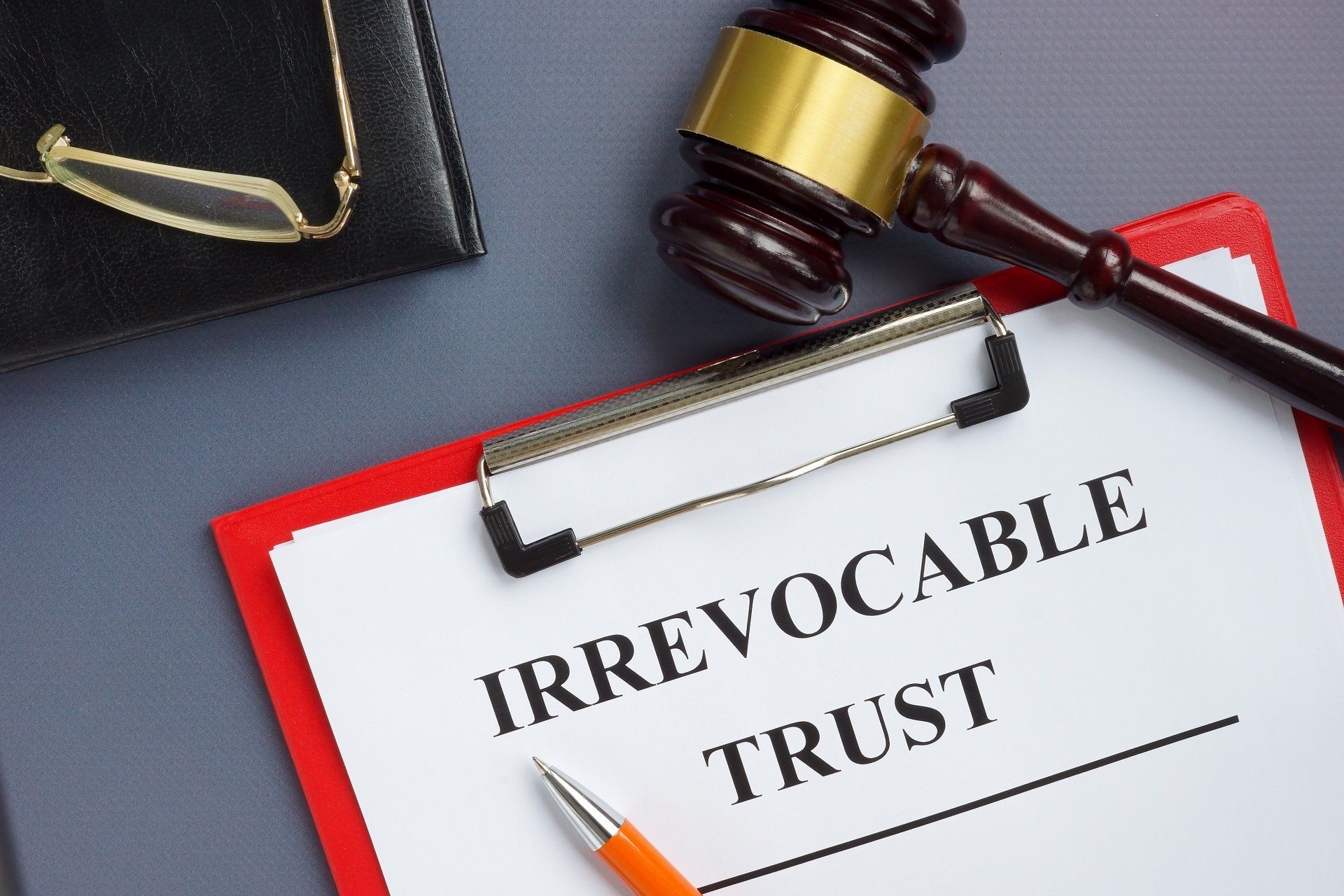When it comes to estate planning, there’s a lot of confusion about what tools are best for passing on assets, protecting loved ones, and avoiding probate. Two of the most common estate planning mechanisms—irrevocable trusts and wills—are often misunderstood, especially when it comes to how and when each should be used. If you’re diving into this world for the first time, don’t worry. You’re not alone. Getting it right early can prevent years of family conflict and court delays later on.
In this guide, we’ll focus on understanding irrevocable trusts vs. wills by breaking down their key differences, real-life applications, benefits, and limitations. Through storytelling, examples, and a friendly, straight-talking tone, we’ll make this complex topic easy to understand—whether you’re writing your first estate plan or reviewing one for someone you love. By the end, you’ll have a clearer picture of which option best fits your life and goals.

What Is a Will? Definition, Executors & Asset Inheritance
The Classic Starting Point for Estate Planning
A will, or last will and testament, is a legal document that lets you spell out what should happen to your property after you die. You can name who inherits your assets, appoint guardians for your children, and even designate someone to manage your estate—this person is known as an executor. It’s the most traditional and widely used tool in estate planning today.
Wills have been the go-to estate planning tool for generations. They’re simple, relatively affordable to create, and widely recognized across jurisdictions. However, wills must go through probate court, which is a formal legal process where a judge validates your will and oversees the distribution of your estate. That step alone can take months—even longer if there are complications.
Here’s the catch: Probate can be slow, costly, and public. It opens the door to family disputes and delays, especially if the will is contested. Plus, your financial and personal affairs become part of the public record once the will enters probate.
So, while wills are a good starting point, they aren’t always the best option for people looking to maximize privacy, protection, or control over their assets. Understanding when a will is enough—and when it’s not—is vital to making the right estate planning decision.
What Is an Irrevocable Trust?
The Estate Planning Tool That Locks Things In
An irrevocable trust is a legal arrangement where the grantor (the person creating the trust) transfers assets into the trust and gives up control over them permanently. Unlike revocable trusts, irrevocable trusts cannot be changed, amended, or revoked without court approval or the consent of all named beneficiaries. That loss of control is what makes the trust legally bulletproof in many ways.
Why would anyone give up control of their own assets? The answer lies in the benefits that irrevocable trusts can offer:
- Asset protection from lawsuits and creditors
- Estate tax reduction for high-net-worth individuals
- Medicaid eligibility for long-term care planning
- Avoidance of probate altogether
- Privacy, since trusts are not filed with the court like wills are
These advantages can far outweigh the rigidity of the trust, especially for those with significant assets or specific goals. That’s why people who value asset protection and privacy often choose irrevocable trusts despite their strict terms.
Understanding irrevocable trusts vs. wills is about more than just control—it’s about balancing flexibility with protection. It’s not always an easy trade-off, but for many families, it’s the most strategic move they can make.
Real-Life Example: When a Will Wasn’t Enough
Sandra, a 62-year-old widow from San Antonio, used a simple will to leave her home and savings to her two adult children. When she passed away, the will entered probate court. That’s when everything started to unravel.
Her daughter contested the will, claiming it didn’t reflect Sandra’s true wishes. Probate took nearly 18 months, cost over $12,000 in legal fees, and left family relationships strained.
In hindsight, if Sandra had created an irrevocable trust, she could have avoided probate and ensured her wishes were followed without court involvement.
This story highlights why understanding irrevocable trusts vs. wills can spare families from emotional and financial turmoil.
Key Differences Between Irrevocable Trusts and Wills
Comparing Control, Privacy, Taxes, and More
To help make sense of it all, here’s a side-by-side comparison of how irrevocable trusts vs. wills stack up in real-world scenarios.
1. Control Over Assets
- Will: You retain control until death.
- Irrevocable Trust: You lose control once assets are transferred.
2. Probate Process
- Will: Must go through probate court.
- Irrevocable Trust: Avoids probate entirely.

3. Privacy
- Will: Becomes public record.
- Irrevocable Trust: Remains private, unless a lawsuit is involved.
4. Protection from Creditors
- Will: Offers no protection.
- Irrevocable Trust: Assets are generally shielded.
5. Estate Taxes
- Will: May be subject to estate taxes if over federal/state thresholds.
- Irrevocable Trust: Can remove assets from your taxable estate.
6. Cost and Complexity
- Will: Low upfront cost, higher probate fees later.
- Irrevocable Trust: Higher upfront cost, less cost later.
Understanding these differences is essential when choosing between irrevocable trusts vs. wills. It’s not about which tool is better—it’s about which fits your goals.
Who Should Use a Will?
Wills Are Best for Simpler Estates
A will might be the better choice if:
- Your estate is modest
- You don’t expect disputes
- You’re not worried about privacy
- You want to name guardians for minor children
- You’re not facing long-term care or tax issues
In these situations, a will provides enough structure to direct the distribution of your property without unnecessary complexity. It’s often the most efficient choice when your financial life is relatively straightforward.
Wills can be created quickly and affordably. For many families, especially younger ones just starting out, a will offers a practical foundation. And as your financial picture grows, your will can evolve or serve as a bridge to more advanced planning tools later on.
Just remember that a will doesn’t protect you from probate delays, public scrutiny, or family drama. If you’re looking for more control or privacy, a will alone might leave too many loose ends.
Who Should Use an Irrevocable Trust?
Irrevocable Trusts Work for Long-Term Protection
Creating an irrevocable trust is ideal for people who:
- Have significant wealth or assets
- Want to avoid estate taxes
- Need to plan for nursing home care
- Are concerned about lawsuits or creditors
- Want to ensure assets pass smoothly without probate

This trust is not a one-size-fits-all solution. Once established, the grantor can’t make changes without a legal process. But if you’re comfortable relinquishing control to gain protection and long-term benefits, it might be the perfect fit.
If your goal is locking in your wishes and reducing legal risks, understanding irrevocable trusts vs. wills becomes more than academic—it becomes practical.
Common Myths About Irrevocable Trusts
Let’s Clear the Air
Because irrevocable trusts are more complex, myths often surround them. Let’s set the record straight:
Myth 1: You need to be a millionaire.
False. People with modest estates use irrevocable trusts to qualify for Medicaid or shield assets from creditors.
Myth 2: You lose all access to your money.
Not entirely true. Depending on how the trust is structured, beneficiaries may still receive income or other benefits.
Myth 3: Trusts are for the elderly.
In reality, people in their 40s and 50s often create irrevocable trusts for long-term planning.
Understanding irrevocable trusts vs. wills requires cutting through misinformation and focusing on what these tools actually do.
Using Both: Why Many People Combine Wills and Trusts
A Layered Approach to Estate Planning
Here’s a secret many lawyers don’t always advertise: most solid estate plans include both a will and an irrevocable trust.
Why?
- The will acts as a “pour-over” document, catching any assets not placed in the trust
- The trust manages larger or more complex assets privately and efficiently
- Having both ensures all your bases are covered

By combining both tools, you gain the benefits of each—without putting all your eggs in one legal basket.
Real-Life Story: Blended Families and Asset Protection
Consider Mark and Dana, a remarried couple with children from prior marriages. They wanted to make sure their biological children received specific assets, while also ensuring the surviving spouse was financially secure.
They established irrevocable trusts for their children and wrote wills to manage the rest. When Mark passed, his trust distributed assets exactly as planned—no arguments, no confusion.
This story proves that understanding irrevocable trusts vs. wills can prevent heartbreak and inheritance battles—especially in blended family situations.
Final Thoughts: Understanding Irrevocable Trusts vs. Wills
Estate planning isn’t just about wealth—it’s about peace of mind. By understanding irrevocable trusts vs. wills, you’re taking a crucial step toward protecting your family, reducing conflict, and ensuring your final wishes are honored.
Wills are simpler but expose your estate to probate. Irrevocable trusts require more planning and commitment, but they offer privacy, protection, and control.
Which one is right for you? That depends on your assets, your health, your goals, and your family’s needs.
Don’t wait for a crisis to figure it out. Talk to an estate planning attorney, assess your options, and choose a path that leaves your loved ones grateful, not confused.








